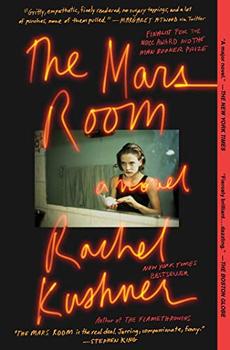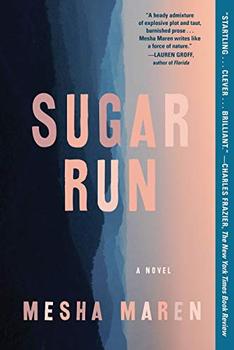Summary | Excerpt | Reading Guide | Reviews | Beyond the book | Read-Alikes | Genres & Themes | Author Bio

A Novel
by Rachel KushnerThere is palpable tension between expectation and reality in Rachel Kushner's third novel. The protagonist, 29-year-old Romy Hall, is an inmate at a Central Valley California facility called Stanville Prison, and used to be a stripper at the Mars Room, where she gave lap dances for $20 a song. During that time she once challenged a boyfriend who asked why she never went to college. She understood the subtext of the question: she was smart, so why did she take her clothes off for money? "You think it's a surprise a girl who works at a strip club is clever?" she asked. "Every stripper I know is clever." She goes on to remark that "he didn't understand about people who grew up in the city, the nihilism, the inability to go to college or join the straight world, get a regular job or believe in the future." This interaction highlights how The Mars Room is also an investigation into societal prejudices and stereotypes of perceived outsiders. There is an unbridgeable gap between these two characters' life experiences.
The city Romy references is early 2000s pre-gentrification San Francisco, where she grew up a drug-addled teen before becoming a stripper and a murderer. Romy narrates her troubled past and equally troubled present as an inmate. The story builds to a climax as the mitigating details of her actual crime emerge. Meanwhile, in intersecting narratives, Gordon Hauser, an English teacher at Stanville, grows inappropriately attached to Romy; a police officer-turned assassin reflects on his long, crooked career on the force; and a repeat offender on drug charges explains how much easier life is when one is incarcerated.
The characters of The Mars Room live in a moral gray area. Romy's crime is understandable but not excusable, and it is the system that is guilty of the most serious transgressions. The prison guards are negligent bureaucratic-minded drones who force one of Romy's fellow inmates to give birth on the floor. Romy's fellow prisoners are certainly not all pleasant people who have been railroaded (many of them behave abhorrently when a transgender inmate is transferred to Stanville), but they deserve better than the treatment they receive. The crooked cop is a racist, sexist murderer, but Kushner imbues him with just enough pathos and sheer stupidity to inspire sympathy. Romy's character is given particular depth as the novel explores how she was never given the chance to grow or thrive despite her obvious intelligence, and now, serving a life sentence, she likely never will be.
The settings are vivid and rendered with stirring pathos. When Romy reflects on the San Francisco of her youth, it is all "clammy fingers of fog working their way into our clothes," and populated by unsavory people called "Leatherman," a vagrant dressed entirely in leather, and "the Scummerz," a group of druggy punk rock squatters, among others. Romy depicts her ex-employer, the Mars Room, in comical terms that highlight its seediness: "If you'd showered you had a competitive edge at the Mars Room. If your tattoos weren't misspelled you were hot property. If you weren't five or six months pregnant, you were the it-girl in the club that night." These settings demonstrate how a person is a product of their environment – for better or worse. The English teacher lives in a cabin in the wilderness outside Stanville and evokes Thoreau while talking to a friend. The friend responds by mentioning the Unabomber, Ted Kaczynski (see 'Beyond the Book'). This is the moral dichotomy of the teacher's character: Is he the contemplative philosopher he would like to believe himself to be, or is he a crazed loon shunning society?
There is a wry irony that runs like a current through the book. Romy notes that in the prison woodshop, inmates are responsible for making "Judges' benches. Jury box seating. Courtroom gates. Witness stands. Lecterns. Judges' gavels. Paneling for Judges' quarters." and so on. The characters are trapped in this system in every aspect of their lives, to a Kafkaesque degree. The Mars Room is clever, instructive, darkly funny and unforgettable – a brilliant exploration of the gap between self-perception and societal judgment.
![]() This review was originally published in The BookBrowse Review in June 2018, and has been updated for the
May 2019 edition.
Click here to go to this issue.
This review was originally published in The BookBrowse Review in June 2018, and has been updated for the
May 2019 edition.
Click here to go to this issue.

If you liked The Mars Room, try these:

by Rachel Kushner
Published 2025
From Rachel Kushner, a Booker Prize finalist, two-time National Book Award finalist, and "one of the most gifted authors of her generation" (The New York Times Book Review), comes a new novel about a seductive and cunning American woman who infiltrates an anarchist collective in France—a propulsive page-turner of glittering insights and dark ...

by Mesha Maren
Published 2019
Set within the charged insularity of rural West Virginia, Sugar Run is a searing and gritty debut about making a run for another life.
Your guide toexceptional books
BookBrowse seeks out and recommends the best in contemporary fiction and nonfiction—books that not only engage and entertain but also deepen our understanding of ourselves and the world around us.